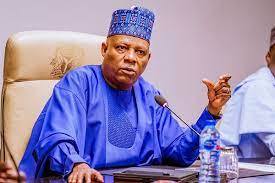The Presidency has engaged the state governments, development partners and other critical stakeholders in the on-going efforts to address the soaring prices of commodities and general food insecurity in the country.
To this effect, Vice President Kashim Shettima on Friday inaugurated the Presidential Food Systems Coordination Unit (PFSCU) as part of efforts by the administration of President Bola Ahmed Tinubu to tackle hunger and hardship in the land.
This followed a presentation by the Technical Assistant to the President on Agriculture, Office of the Vice President, Marion Moon.
Addressing members of the group comprising governors, cabinet ministers and representatives of development partners,
Shettima said, “The nation is facing a rare food security crisis and the sooner we come to terms with the reality, the better. Food insecurity endangers the very basis of our democratic experiment and this is why all hands have to be on deck. We are in a food security crisis but it also provides us the opportunity to re-engineer and reposition the nation on a firmer footing.”
Outlining the mandate of the PFSCU, the vice-president said the unit was not created to usurp the functions of the Ministry of Agriculture, stressing that the urgency and seriousness of the matter at hand requires the ideas and resources of all stakeholders.
Earlier, governors in the committee outlined plans to modernise farming practices, increase crop yields and transform Nigeria into a self-sufficient food producer.
Governor Bassey Otu of Cross River state said the state government was looking forwards to feeding the country, adding that his government must modernise agriculture to feed the population.
“We are an agrarian state, and we have stepped up our game,” he said.
Governor Babagana Zulum of Borno state emphasised the need for a coordinated approach, citing low productivity and population growth as a major challenge to the nation’s food security drive.
He called for investment in commercial agriculture, improved funding, and enhanced security for farmers.
Also, Governor Umar Namadi of Jigawa state highlighted the state’s potential to achieve food security.
“All that is needed is the political will to drive the process. Our lands are very fertile. In Jigawa, there are places where we are yielding ten tonnes per hectare of rice.
“There are so many places like that. As of today, our average in Jigawa state is about 12.56 per hectare. We are on the right course. What we need is sustained political will,” he said.
Governor Mohammed Bago of Niger state proposed his state as a pilot for the president’s food security initiative, saying the state government had invested over N100 billion in agricultural mechanisation with 5, 000 tractors and 20 pilot irrigation systems available.
On his part, the Country Representative of the Food and Agricultural Organisation (FAO), Mr. Dominique Koffy Kouacou, who spoke on behalf of a group of donors, pledged their commitment to the success of all the efforts by the federal government aimed at addressing food insecurity in the country.
He said the enthusiasm exhibited by the president and vice-president in addressing challenges in the agricultural sector “is commendable and has re-awakened the commitment of donors in the sector.”
